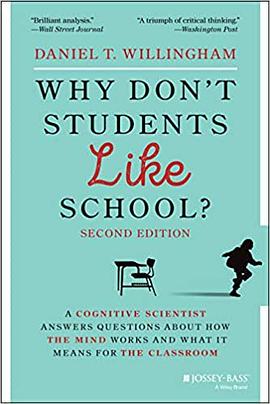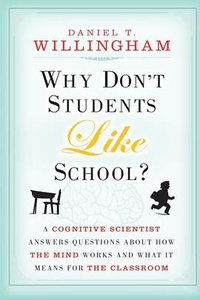Why Don't Students Like School? (2/e)
Douban
A Cognitive Scientist Answers Questions About How the Mind Works and What It Means for the Classroom
Daniel T. Willingham
visão geral
In this new edition of the highly regarded Why Don't Students Like School? cognitive psychologist Daniel Willingham turns his research on the biological and cognitive basis of learning into workable teaching techniques. This book will help you improve your teaching practice by explaining how you and your students think and learn. It reveals the importance of story, emotion, memory, context, and routine in building knowledge and creating lasting learning experiences.
With a treasure trove of updated material, this edition draws its themes from the most frequently asked questions in Willingham’s “Ask the Cognitive Scientist” column in the American Educator. How can you teach students the skills they need when standardized testing just requires facts? Why do students remember everything on TV, but forget everything you say? How can you adjust your teaching for different learning styles? Read this book for the answers to these questions and for practical advice on helping your learners learn better.
contents
Acknowledgments to the First Edition . . . . . . . . . . . . . . . . . . xi
Acknowledgments to the Second Edition . . . . . . . . . . . . . . . xiii
The Author . . . . . . . . . . . . . . . . . . . . . . . . . . . . . . . . . . . . . . . . xv
Introduction . . . . . . . . . . . . . . . . . . . . . . . . . . . . . . . . . . . . . . xvii
Chapter 1 Why Don’t Students Like School? . . . . . . . . . . . . . . . . . . . . . . . . . . . . 1
Chapter 2 How Can I Teach Students the Skills They Need When Standardized Tests Require Only Facts? . . . . . . . . . . . . . . . . . . . . . . 25
Chapter 3 Why Do Students Remember Everything That’s on Television and Forget Everything I Say? . . . . . . . . . . . . . . . . . . . . . . . . . . . . . . . 57
Chapter 4 Why Is It So Hard for Students to Understand Abstract Ideas? . . . . 95
Chapter 5 Is Drilling Worth It? . . . . . . . . . . . . . . . . . . . . . . . . . . . . . . . . . . . . . 119
Chapter 6 What’s the Secret to Getting Students to Think Like Real Scientists, Mathematicians, and Historians? . . . . . . . . . . . . . . . . . 143 x
Contents
Chapter 7 How Should I Adjust My Teaching for Different Types of Learners? . . . . . . . . . . . . . . . . . . . . . . . . . . . . . . . . . . . . . . 167
Chapter 8 How Can I Help Slow Learners? . . . . . . . . . . . . . . . . . . . . . . . . . . . 191
Chapter 9 How Can I Know Whether New Technology Will Improve Student Learning? . . . . . . . . . . . . . . . . . . . . . . . . . . . . . . . . . . . . . . 217
Chapter 10
What About My Mind? . . . . . . . . . . . . . . . . . . . . . . . . . . . . . . . . . . 251
Conclusion . . . . . . . . . . . . . . . . . . . . . . . . . . . . . . . . . . . . . . . . . . . . 273
Glossary . . . . . . . . . . . . . . . . . . . . . . . . . . . . . . . . . . . . . . . . . . . . . . 281
Notes . . . . . . . . . . . . . . . . . . . . . . . . . . . . . . . . . . . . . . . . . . . . . . . . . 285
Index . . . . . . . . . . . . . . . . . . . . . . . . . . . . . . . . . . . . . . . . . . . . . . . . . 291



